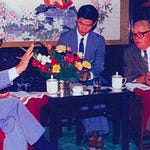The Culture Journalist is a podcast about culture in the age of platforms. Episodes drop every other week, but if you want the full experience — including bonus episodes, culture recommendations, and our eternal parasocial friendship — we recommend signing up for a paid subscription. All earnings go back into making the show.
Hey friends. This week, we’re re-upping our episode with writer Cord Jefferson, who just won an Oscar for Best Adapted Screenplay for American Fiction, which he also directed. American Fiction was adapted from the 2001 novel Erasure, by writer Percival Everett. And since Sunday night, the film, and Cord’s comments about it, have been provoking a lot of interesting conversation about Black representation in Hollywood and the publishing industry—which also happens to be the subject of the film itself, and which we encourage you to dig into.
Cord, as you may know, is a former journalist and Gawker editor with very strong opinions about the economics of cultural production. Which is why we weren’t surprised when he used his acceptance speech to offer a pretty candid take about risk aversion in Hollywood—and the need for executives to take more chances on independent filmmakers. “I understand that this is a risk-averse industry. I get it. But $200 million dollar movies are also a risk,” he said. “Instead of making one $200 million dollar movie, try making twenty $10 million dollar movies, or fifty $4 million dollar movies.”
It wasn’t the first time we’d heard Cord talking about this stuff. In fact, this was one of the topics we went long on with him when we had him on the show in 2021 to mark the start of Succession’s third season. Cord was a writer for season two, in addition to working on series like The Good Place, Station Eleven, and Watchmen, for which he won an Emmy. What started as a conversation about Succession’s Roy family—and Cord’s experiences transitioning from a career in media to a career in TV and film—evolved into a deeper meditation on the struggles writers in both fields are facing in a creative economy where culture is evaluated based on numbers, where pre-visibility and remakes trump original ideas, and where what executives believe is “good for business” feels increasingly incompatible with artistic risk-taking.
We recorded this conversation long before last year’s Writer’s Guild and SAG-AFTRA strikes, not to mention American Fiction itself, but the issues we discuss have become only more relevant with time. You can think of it as an extended riff on the argument he made on national TV this week—and it’s also a great look into where Cord comes from, the moral dilemmas that result when we allow algorithms to evaluate art, and perhaps some of the seeds of thoughts that inspired American Fiction.
Follow Cord on the platform formerly known as Twitter
Check out the trailer for American Fiction
Watch American Fiction
















Share this post